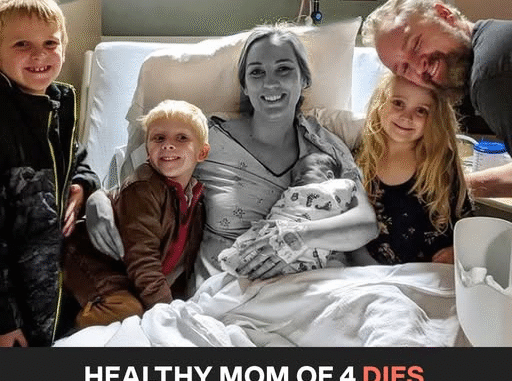
Kathleen Thorson’s life was one of quiet strength, deep love, and everyday magic. She was the kind of woman who made birthdays special, turned simple dinners into moments of connection, and gave her children the gift of a childhood that felt safe, warm, and full of meaning.
On December 29, 2019, she welcomed her fourth child, a baby boy named Teddy, into the world. The delivery was smooth. She and Teddy were healthy. The Thorson family — now six strong, with children Danny (7), Gracie (6), James (4), and newborn Teddy — returned home to Medford, Oregon, ready to begin their new chapter.
But just five days later, on January 3, 2020, everything changed.
Kathleen began experiencing sudden, severe symptoms. She was rushed to the hospital, where doctors diagnosed her with an intracerebral hemorrhage — a devastating brain bleed with no warning signs.
Despite emergency surgery to relieve pressure on her brain, her condition worsened. She passed away just days later at the age of 34.
Brain bleeds are among the most dangerous medical emergencies. When a blood vessel bursts in the brain, pressure builds rapidly, cutting off oxygen and killing brain cells within minutes.
Symptoms can include:
- Sudden, intense headaches
- Nausea and vomiting
- Weakness or numbness (often on one side)
- Confusion, slurred speech, dizziness
- Loss of consciousness
In Kathleen’s case, no underlying cause was found. Her pregnancy had been healthy. Her delivery, normal. The tragedy struck without rhyme or reason.
Before she died, Kathleen had made a quiet but powerful decision — she had registered as an organ donor.
It was a choice she never spoke about publicly, but one she had formally committed to. And in her final moments, that decision became a lifeline for others.
Twelve people received her organs — twelve lives forever changed because of her.
Her husband, Jesse, said the donation brought a sense of purpose amid the grief.
“I’m glad my kids will know their mom for doing this,” he said.
Their oldest son, Danny, told his first-grade class simply:
“My mom helped people.”
Jesse shared how comforting it was to know part of Kathleen lived on — not just in memory, but in the hearts and bodies of strangers who now had a second chance.
On January 23, 2020, he posted a photo of a memorial medallion from the organ donor program.
“This isn’t how they treat rare donors,” he wrote.
“This is how they treat all donors. And I can’t tell you what this means to me and my children.”
Kathleen and Jesse met on her first day of high school. He was a junior. She was new. He made a clumsy comment — and they’ve been inseparable ever since.
“We never spent a minute apart,” Jesse said.
They married in 2006, earned degrees together — including graduate studies in England — and built a life centered on family.
When their first child was born prematurely, Kathleen asked Jesse if she could stay home and be “just a mom.”
He said yes — without hesitation.
For years, she poured her heart into raising their children. Jesse became a nurse, while Kathleen became the steady rhythm of their home — the one who baked pies, soothed nightmares, and made every day feel like it mattered.
“She was magic,” Jesse said — not in a fairy-tale way, but in the way she made people feel seen, safe, and deeply loved.
After her death, Jesse made a promise — to keep her spirit alive in their home.
“I’m learning how to do all the things she did,” he said. “And I’m making sure her kindness is in every crack of this house.”
The community responded with overwhelming love. A GoFundMe launched by a family friend raised over $130,000 — far exceeding its goal — to help cover medical and funeral costs.
Donors called her a “mother extraordinaire,” a “bringer of love and magic.”
And though she’s gone, her presence remains — in her children’s laughter, in the pies Jesse now tries to bake, and in the 12 lives that carry her gift every single day.